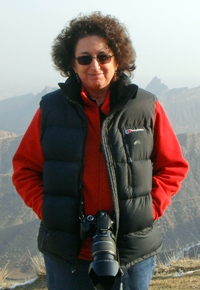Marsha Levine
Although my formal training was in Anthropology (BA, Barnard College, NY) and Archaeology (PhD, University of Cambridge), for the past 40 years my photography has played a important role in my research. The wind has changed and now my research plays an important role in my photography.
My earliest serious fieldwork took place in Turkey and then France, the UK, Denmark. Once I finished my PhD, my fieldwork took me to Russia, Ukraine, Armenia, Kazakhstan, Kyrgyzstan, China and a few other places. My camera was my most constant companion on all these journeys. Conferences and workshops gave me further photographic opportunities, as did and does virtually any trip anywhere.
My research travels, most particularly, put me in a position to meet people and visit places inaccessible to most other travellers. I tried to take advantage of this as much as possible, photographing people, places, nature, landscapes, cityscapes, wild and domestic plants and animals, traditions and life-styles in a rapidly changing world.
I am especially privileged to have worked in the USSR and its successor states between 1988 and 2008. This was a period of extreme change - political, economic, social and psychological - for the people I worked with or encountered in research institutions, cities, villages, shops, markets, on the street, in the steppe. From 2003 to 2008 I also worked in China, along the Yellow River valley and across the Silk Road to Xinjiang. Again, it would be hard to imagine a region where change could be more extreme.
Regretfully, I am not good at languages, though I have expended considerable effort in an attempt to learn Russian. Sometimes, while travelling, I had an interpreter to explain what I was seeing. Sometimes I just had to let the subjects speak for themselves.
Change, then, is the central theme running through my photography. From exciting changes in photographic technology to disturbing environmental changes; birth, growth, death, the rhythm of the seasons, the destruction of cultures, the loss of traditions ...
My earliest serious fieldwork took place in Turkey and then France, the UK, Denmark. Once I finished my PhD, my fieldwork took me to Russia, Ukraine, Armenia, Kazakhstan, Kyrgyzstan, China and a few other places. My camera was my most constant companion on all these journeys. Conferences and workshops gave me further photographic opportunities, as did and does virtually any trip anywhere.
My research travels, most particularly, put me in a position to meet people and visit places inaccessible to most other travellers. I tried to take advantage of this as much as possible, photographing people, places, nature, landscapes, cityscapes, wild and domestic plants and animals, traditions and life-styles in a rapidly changing world.
I am especially privileged to have worked in the USSR and its successor states between 1988 and 2008. This was a period of extreme change - political, economic, social and psychological - for the people I worked with or encountered in research institutions, cities, villages, shops, markets, on the street, in the steppe. From 2003 to 2008 I also worked in China, along the Yellow River valley and across the Silk Road to Xinjiang. Again, it would be hard to imagine a region where change could be more extreme.
Regretfully, I am not good at languages, though I have expended considerable effort in an attempt to learn Russian. Sometimes, while travelling, I had an interpreter to explain what I was seeing. Sometimes I just had to let the subjects speak for themselves.
Change, then, is the central theme running through my photography. From exciting changes in photographic technology to disturbing environmental changes; birth, growth, death, the rhythm of the seasons, the destruction of cultures, the loss of traditions ...
